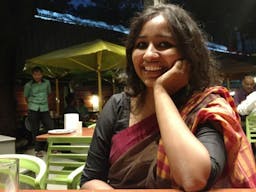I want to loiter. Will you join me?
Apr 28, 2022
Story
Every time I return late, my mother stays up worried about my safety. My grandmother suggests that I be married off. And me, I just want the freedom to navigate the city irrespective of time, whether it is for work or a good time with my friends.
I want well-lit streets with sufficient police patrolling, better public transport, clean toilets, so that I can come home when I want to. I have been lucky that I was at the receiving end of catcalling just once on a dimly lit street on my way to a metro station (subway) in Delhi.
But I don't think just policing and better infrastructure will help our case.
One thing that I notice while working and travelling as a reporter, especially late at night, is that there are many more men than women out in the street. They might be enjoying a cup of tea, a smoke, or just standing around shooting the breeze. Sometimes I see girls in these groups, but I have rarely ever seen a group of girls just chilling in public spaces.
All these times I’ve just zipped by on my two-wheeler, rushing home to “safety”. The city I live in Pune, in the western Indian state of Maharashtra, is a fairly safe city to live in. Yet, the pressure I feel like a load on my chest while riding home at 1 AM is much too real.
In her TedX talk, author of \"Why Loiter\" Shilpa Phadke talks about how \"safety\" is a restrictive concept. She talks of how the fear of strangers attacking the women is high, but data says more women are attacked in personal spaces.
She turns the safety argument on its head by arguing that women should not submit to the restrictive concept of safety but access public spaces, while keeping in mind the potential risks of such spaces. She calls this a woman’s right to risk. She also extends this idea to other marginalised sections of the society, like migrants, and goes on to highlight how crowded spaces are safer.
One of the ways she suggests for reclaiming the public spaces is by loitering!
She argues that loitering is a tool that challenges gender norms, allows one to physically claim the city, and amplifies inclusion. Women are not expected to be out in the streets not being productive or busy.
I want the city to belong to me, and I want to belong to the city. I want to claim public spaces like roadsides, parks, bus stops, corners with food stalls, lakesides and river banks, and long stretches of roads covered by trees. I want to laugh loudly with my friends by tea shops on the side of the road. I want to taste the night breeze without tasting the fear of being attacked.
I think the city would be safer with more and more women claiming public spaces like this. Why just women, even marginalised sections of the society like Phadke says. After all, there is strength in numbers.
I want to loiter. Will you join me?
Cover image from https://www.quora.com/Are-there-any-pubs-discos-nightclubs-in-Pune-where...




